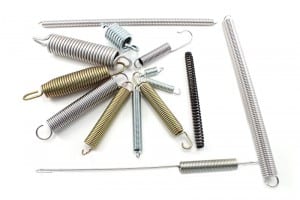 The close wound design of extension springs allows them to absorb and store energy and provides the ability to exert a pulling force between two mechanisms. This makes them a popular choice for garage door assemblies, medical devices, farm machinery, carburetors, OEMs and so much more.
The close wound design of extension springs allows them to absorb and store energy and provides the ability to exert a pulling force between two mechanisms. This makes them a popular choice for garage door assemblies, medical devices, farm machinery, carburetors, OEMs and so much more.
Using our CNC spring coiling machines, we can produce custom extension springs with wire diameters from 0.005″ to 0.250″. Suited for use in a wide range of applications, including carburetors and farm machinery, our custom extension springs are available in various materials including stainless steel.
End Configurations
Because these unique springs require a method of attachment to other parts of an assembly there is a range of end configuration options in order to facilitate the attachment. Common end configurations that we offer include side hooks, center hooks, extended hooks, combination hooks, and custom shaped hooks.
Custom Extension Spring Design
Our in-house engineering department can design springs to have initial tensions according to the load requirement of your applications. We can also validate spring designs prior to manufacturing, and accept designs in a number of file formats, such as DWF, DWG, DXF, FBX, JPG, PRT, SAT, TIF, STP, or PDF. Secondary services such as color-coding, plating, and heat-treating are provided for extension springs depending on your application needs.
Contact us today to learn more about our customized solutions for your unique application.

